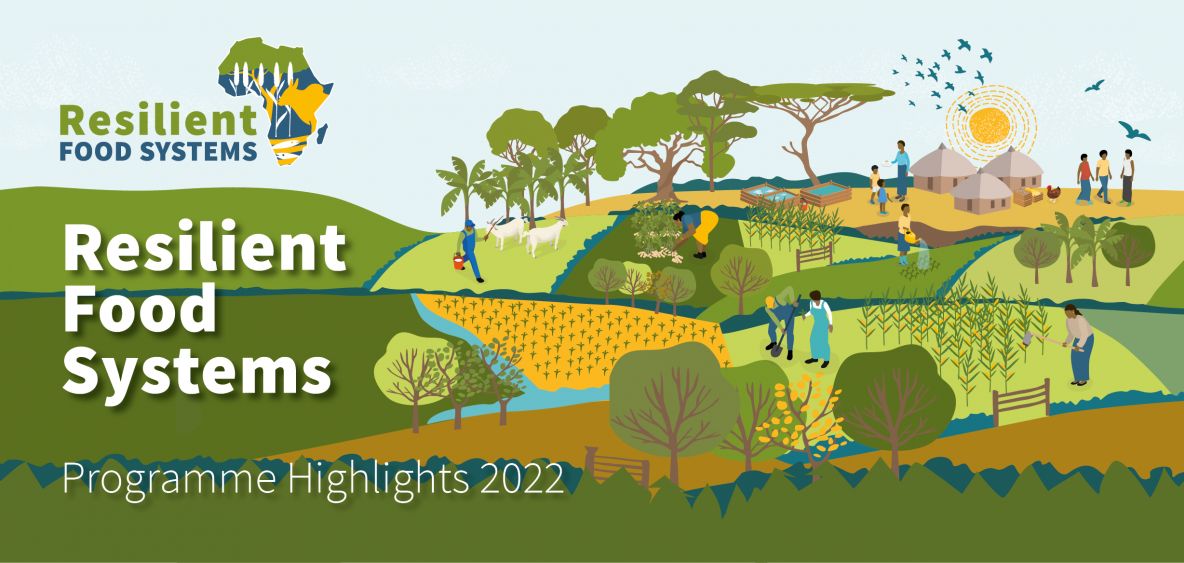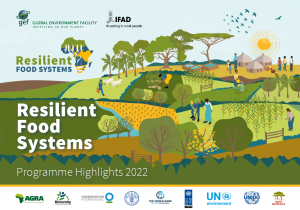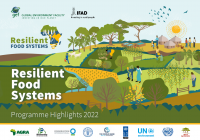
The RFS 2022 Programme Highlights report showcases the achievements of regional partners, country project teams and beneficiary communities working together to enhance long-term food systems resilience in 12 African countries.
The Resilient Food Systems (RFS) programme has published its 2022 Programme Highlights Report, showcasing the achievements of the 12 RFS country projects and Hub partners over a very full year.
Led by the International Fund for Agricultural Development (IFAD) and funded by the Global Environment Facility (GEF), the RFS programme has been working to enhance long-term sustainability and resilience for food security in sub-Saharan Africa since 2017. Over this historic 5-year period, the programme has adapted to a global pandemic, reached more than 4 million beneficiaries, and restored 338,714 hectares of previously degraded land. These are no small feats on behalf of smallholder farmers, and the 2022 reporting period reflects this through its heavy focus on sustainability and scaling of the programmatic impact.
The report demonstrates how connecting agroecological approaches and smallholder livelihoods through an integrated approach can lead to long-term scalability and sustainability beyond the end of the programme.” - Juan Carlos Mendoza Casadiegos, Director of the Environment, Climate, Gender and Social Inclusion Division - IFAD
The RFS programme received a six-month,
no-cost extension past its original end date, leading to an overall
programmatic wrap on 30th June 2023, but the Kenya, Nigeria, Senegal, Eswatini,
and Burkina Faso projects closed their projects in 2022.
But that’s certainly not to say that their impact ended in December!
The RFS integrated approach promotes transformative change that affects systems, institutions and livelihoods in the long term. By working alongside key public and private sector, and civil society actors in their local contexts, the country projects have facilitated change through mechanisms like multistakeholder platforms like this one in Nigeria.
[The RFS Nigeria project] helped increase farmers’ yield through the adoption of climate-smart agricultural technologies. Farmers are adopting techniques of safeguarding their environment through soil erosion control, carbon sequestration and establishing an agroforestry system. It set a stepping stone in creating an enabling environment by reviewing and harmonising all Nigerian Agricultural policies favouring smallholder farmers.” - Rhoda Dia, Project Lead, Integrated Landscape Management to Enhance Food Security and Ecosystem Resilience in Nigeria
One major achievement of the RFS Nigeria
project this year was the January 2022 passage of the National Rice Council Bill,
which was achieved in part through a culmination of efforts by the project
team. The National Rice Development Council is now bringing the voices, goals,
needs and contexts of RFS beneficiaries into National policy spaces - something
that will continue to benefit Nigerian smallholder farmers indefinitely.
For country projects who are continuing into 2023, this year provided ample opportunity to continue strengthening their sustainability plans, as well as celebrate their project successes.
In Ethiopia, the project surpassed its target of restoring 120 000 hectares of previously degraded land by 9% and reported that 89% of land under integrated landscape management in the project area is owned by women. This was achieved through the robust engagement of stakeholders who are soon to be the sole operators of the systems in place.
The extension has given us an important additional time to complete and develop the stakeholders accountability and sense of ownership.” - Birara Chekol, Project Lead, Integrated Landscape Management to Enhance Food Security and Ecosystem Resilience, RFS Ethiopia
2022 also saw RFS stakeholders convene in
person for the first time since the COVID-19 pandemic, to attend the Resilient Food Systems Knowledge Exchange and Learning
Workshop in Malawi. The workshop was an opportunity to share
experiences among the RFS country project teams and lead agencies with
stakeholders like the Global Environment Facility (GEF) Secretariat, government
officials and the African Union Commission. The learning generated by this
gathering not only serves to connect development actors in Africa and share
experiences but also feeds into and influences the new GEF Food Systems
programming for the 7th and 8th replenishment cycles, and beyond.
The RFS programme has had an impactful year in enhancing long-term food systems resilience, but our story isn’t over.
Read the 2022 Programme Highlights to learn more about this reporting period and hear from the actors themselves in the 2022 video, Reflections from Resilient Food Systems: Piloting an integrated approach and celebrating successes, filmed during the September Workshop.


In 2022, the RFS programme made significant progress toward enhancing the long-term resilience and sustainability of smallholder farming systems. The 2022 Programme Highlights report showcases the achievements and innovations of the RFS regional partners, country project teams and beneficiary communities in 12 countries in sub-Saharan Africa.
The 2022 reporting period was marked by our efforts to enhance the sustainability and scaling of project interventions. 2022 saw the completion of 8 country projects and continual actions by the remaining projects to implement further sustainability measures and keep the programme benefits going. This report captures and highlights the considerable learning and knowledge that has been generated, shared and possible by the collective efforts of all RFS partners.
Subscribe to our monthly newsletter to receive updates on stories directly from the field across all our projects, upcoming events, new resources, and more.